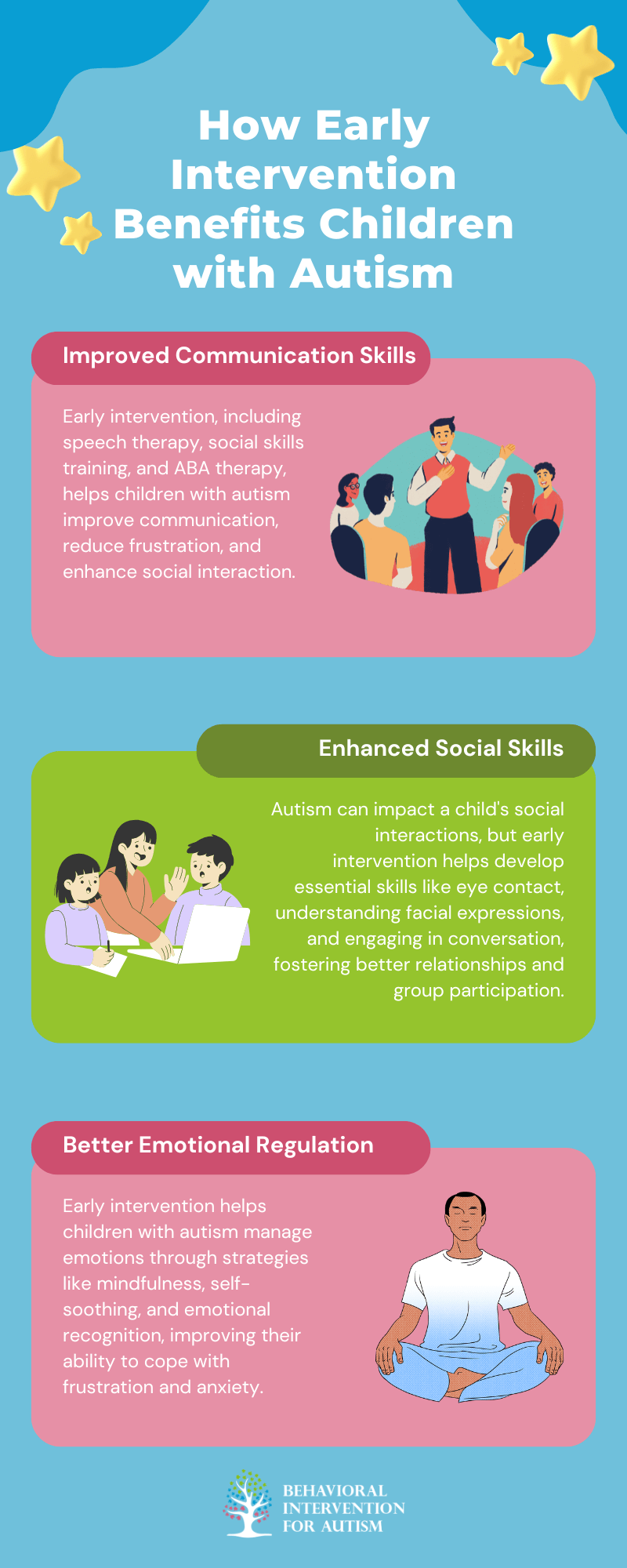
Table of Contents
Autism spectrum disorder (ASD) is a developmental disorder that affects social interaction, communication, and behavior. Early intervention is a critical factor in helping children with autism thrive and achieve their full potential. When intervention begins at an early age, children have a better chance of developing essential life skills, improving social interactions, and achieving long-term success. In this article, we will explore the many reasons why early intervention is important for autism, how it can positively impact children, and the role of ABA therapy in this process.
The Critical Window for Early Intervention
Research shows that the brain is most responsive to learning and development during the early years of life, typically from birth to age five. During this period, a child’s brain is incredibly adaptable, and the foundation for cognitive, social, and emotional skills is established. Early intervention takes advantage of this “critical window” by providing therapies and support when the brain is most capable of change.
One of the key reasons early intervention is so effective is brain plasticity, also known as neuroplasticity. Neuroplasticity refers to the brain’s ability to reorganize and form new neural connections throughout life, but it is especially pronounced in early childhood. By intervening early, we can help redirect and strengthen neural pathways that contribute to communication, social skills, and behavior.
How Early Intervention Benefits Children with Autism
Early intervention can significantly improve a child’s chances of developing essential skills. By providing targeted support, children with autism can make strides in areas such as communication, socialization, and adaptive behavior. Here are some of the key benefits of early intervention:

The Role of ABA Therapy in Early Intervention
Applied Behavior Analysis (ABA) therapy is one of the most widely used and effective interventions for children with autism. ABA therapy focuses on reinforcing positive behaviors and reducing challenging behaviors through structured, individualized teaching methods. Early ABA therapy helps children develop communication, social, and adaptive skills by using positive reinforcement techniques that encourage desired behaviors.
One of the advantages of ABA therapy is that it can be tailored to meet the specific needs of each child. A Board Certified Behavior Analyst (BCBA) works with families to create a personalized treatment plan based on the child’s strengths, challenges, and goals. This individualized approach ensures that the child receives the most effective therapy suited to their unique needs.
ABA therapy focuses on promoting lasting changes in behavior that benefit the child in the long term. By addressing core areas such as communication, social skills, and self-help skills, ABA therapy helps children become more independent and successful in school and social settings. The skills learned in early intervention continue to have a positive impact as the child grows and develops.
How Parents Can Support Early Intervention
While professional therapy is a key component of early intervention, parents play an integral role in their child’s success. By actively participating in the intervention process, parents can reinforce the skills their child is learning at home and in the community.
Children with autism benefit from consistency and routine. Parents can support early intervention by creating structured environments that promote learning and behavioral development. Whether it’s following specific routines at home, practicing social skills during everyday activities, or reinforcing communication skills, parents can make a big impact by providing consistency and encouragement.
Parents should work closely with therapists, educators, and other professionals involved in their child’s care. Open communication and collaboration are essential to ensure that the child is receiving the most appropriate support across all settings. By staying informed about the strategies being used and asking questions, parents can better understand how to help their child at home.
The Long-Term Benefits of Early Intervention
The long-term benefits of early intervention are significant and far-reaching. Children who receive early intervention are more likely to:
- Achieve better academic outcomes and participate successfully in school
- Develop strong social relationships with peers and family members
- Gain greater independence in daily life and self-care
- Improve overall quality of life by reducing the impact of autism-related challenges
Early intervention can set the stage for a lifetime of success, helping children with autism navigate challenges, build on their strengths, and lead fulfilling lives.
Early intervention is not just about addressing immediate needs; it is an investment in a child’s future. By providing timely, tailored support, children with autism have the opportunity to thrive academically, socially, and emotionally. The earlier the intervention, the greater the potential for positive outcomes. Parents, caregivers, and professionals all play an important role in ensuring that children receive the support they need during this crucial period of development.
Get Started Today
Early intervention plays a crucial role in the development of children with autism, helping them build essential skills that will benefit them throughout their lives. When autism is addressed early on, it becomes easier to create personalized strategies that foster independence and improve social, communication, and behavioral skills. Behavioral Intervention For Autism provides effective ABA programs in Florida, designed to support each child’s unique needs. Our skilled team works closely with families to develop tailored plans that empower children to thrive. If you’re ready to make a positive impact on your child’s life, contact us today and learn how we can help.
- 9 Common Obsessions of Children With Autism You Should Know - February 25, 2025
- What is Neurodiversity? A Guide to Embracing Differences - February 25, 2025
- Understanding Hyperfocus in Autism: What It Means and Why It Happens - February 25, 2025
